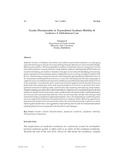Please use this identifier to cite or link to this item:
https://cris.library.msu.ac.zw//handle/11408/711Full metadata record
| DC Field | Value | Language |
|---|---|---|
| dc.contributor.author | Chauraya, Efiritha | - |
| dc.date.accessioned | 2015-10-09T14:10:38Z | - |
| dc.date.available | 2015-10-09T14:10:38Z | - |
| dc.date.issued | 2013 | - |
| dc.identifier.issn | 1815-9036 | - |
| dc.identifier.uri | http://hdl.handle.net/11408/711 | - |
| dc.description.abstract | Academic terrains in Zimbabwe universities, and indeed in universities everywhere, are undergoing unprecedented change as they face the many challenges brought about by new economies of knowledge, efficiency and excellence. The issues of academic excellence in particular, have seen many lecturers at the universities embark on research and further study. Based on academic mobility paths of PhD students at one of the most leading universities in Zimbabwe, this paper is concerned with identifying and examining gender inequalities in transnational academic mobility of lecturers, as well as, strategies to confront these barriers. A preliminary survey by the researcher had recognized a glaring deficiency of female lecturers in the transnational mobility paths of the lecturers. It was with this background that this study sought to unpack the nature of conditions and constraints inhibiting transnational education of the female lecturers at this institution. A combination of the social constructionist approach and the feminist theory was preferred for this study because of the need to put participants at the centre in search for their views, experiences and voices in defining reality, and at the same time examining and critiquing social relations. Purposive sampling was used to select research participants. Only lecturers currently pursuing their doctoral studies were targeted. Semi-structured interviews, complemented with closed and open-ended questionnaires were the main instruments for data collection. These were felt to provide rich data that could give solid material for building a significant analysis of participants’ views. The study findings revealed that gender norms are important to understand transnational lecturers’ academic choices. Mounting empowerment programmes for female lecturers in particular and for the university community in general, as well as improving basic infrastructure, was suggested as a major pathway that can make the transnational academic mobility of female lecturers comparable with that of their male colleagues. | en_US |
| dc.language.iso | en | en_US |
| dc.publisher | Midlands State University | en_US |
| dc.relation.ispartofseries | The Dyke;Vol. 7, No. 3; p.85-101 | - |
| dc.subject | Gender, gender discrimination, Academic excellence, Academic mobility, transnational education. | en_US |
| dc.title | Gender discrimination in transnational academic mobility of lecturers: a Zimbabwean case | en_US |
| dc.type | Article | en_US |
| item.fulltext | With Fulltext | - |
| item.openairetype | Article | - |
| item.languageiso639-1 | en | - |
| item.cerifentitytype | Publications | - |
| item.grantfulltext | open | - |
| item.openairecristype | http://purl.org/coar/resource_type/c_18cf | - |
| Appears in Collections: | Research Papers | |
Files in This Item:
| File | Description | Size | Format | |
|---|---|---|---|---|
| chauraya.pdf | 274.75 kB | Adobe PDF |  View/Open |
Page view(s)
42
checked on Jul 26, 2024
Download(s)
6
checked on Jul 26, 2024
Google ScholarTM
Check
Items in MSUIR are protected by copyright, with all rights reserved, unless otherwise indicated.


